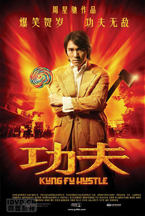Kung Fu Your Brain Before Finals

More Kung Fu than you can shake a stick at.
April 29, 2005
BY YASUHITO YAMAMOTOStaff Writer
This is a movie that can be enjoyed by anyone. If you’re feeling good, go see it to further escalate your high spirits. If you feel bad, this movie blows your head off and replaces it with a new one. Kung Fu Hustle is some great mindless fun for anyone who has a big exam the next day, but has done nothing to prepare for it. Now, I’m not saying you will by any means do better on your exams because of watching this movie. I bet you’d still get an F, but the point is that it won’t matter much anymore.
There is a plot somewhere in this movie, though it’s really not essential. Talking about the plot could be one of the more meaningless things I might do over this weekend. This movie is, rather, non-stop Kung Fu action, which is as breathtaking as anything you’d see in The Matrix and it’s mighty silly as well.
I mentioned The Matrix in comparison to Kung Fu Hustle, and you can in fact find many parodies from The Matrix in Hustle, not only in the action scenes but also in the clothing designs and sound effects. It’s almost impossible to avoid picturing The Matrix while watching Kung Fu Hustle, but all the same, that only makes it funnier.
For instance, at the beginning of Kung Fu Hustle, you see a bunch of people in black suits marching on a street, an obvious send-up to a scene from The Matrix: Reloaded where hundreds of Agent Smiths are coming toward Neo. The Agent Smith-like character is one of the major characters in this movie-his name is Brother Sum and a leader of the Axe Gang as well as a lead dancer of Axe Gang male dancers. Brother Sum is played by Chan Kwok Kwan, and if you’ve seen Shaolin Soccer, he played a goalkeeper in the film. Anyway, the powerless Brother Sum (unlike his Matrix counter part) hires skillful Kung Fu fighters in order to keep his control over the town’s people, but his influence starts collapsing once he runs into a small rural community known as “Pig Sty Alley,” that turns out to be a nest of crouching tigers and hidden dragons. After the encounter, endless battles between Axe Gang and Pig Sty break out and series of amazing Kung Fu fighting whet our eyes, though it sometimes pushes the limits of what is actually considered Kung Fu.
The best thing about this movie are its extremes, which work well because the film’s a comedy. Extreme silliness, cartoon-like slap-stick action, and extreme superhuman powers-these illogical things, which would simply disappoint the audience if they were in The Matrix, are here consumed as extreme funny-ha-ha, and thus no one asks questions like why the landlady’s bra is flying off in the air when she crashes into an advertising board.
Although the movie is mighty funny, the Kung Fu action is as cool as it is in other popular Chinese action movies, and one of the elements that brings action scenes into such spectacles is the up-beat music featured in the soundtrack played with Chinese stringed instruments; sounds that turn seemingly week residents of Pig Sty Alley into somewhat legendary figures.
This movie is not necessarily a must-see, but you will be satisfied in the end. Like other action movies, this one will take you into a Kung Fu fever, and you may consider joining a Kung Fu class, though I agree that only one in a million would become such a Kung Fu master-learning of Kung Fu is as easily available from a book sold by a stranger on a street.
By the way, although I strongly believe that a greatness of this movie belongs to its extreme nonsense in almost every element of the film, some critics seem to have managed to pull out a deep message from the Stephen Chow’s choice of setting amid the chaos of 1940’s pre-revolutionary China and from the use of axe as a symbol of gang. Though it is possible to interpret this movie with a deeper theme, nonetheless, if your brain automatically does such an activity while watching it, I think your brain is contaminated too much with the critical thinking of academic propaganda.










































































